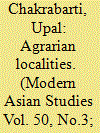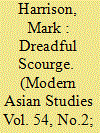|
|
|
Sort Order |
|
|
|
Items / Page
|
|
|
|
|
|
|
| Srl | Item |
| 1 |
ID:
144553


|
|
|
|
|
| Summary/Abstract |
This article writes the agrarian history of an obscure locality, Cuttack, in early-nineteenth-century British India. In doing so, instead of exalting the explanatory power of the local, or the particular, it interrogates the category of the ‘local’ itself by demonstrating how it was assembled as the object of agrarian governance in British India through a densely interwoven network of discursive practices. I present this network as various inter-regional practices and debates over agrarian governance in British India and some methodological debates of political economy in contemporary Britain. This article argues that the governmental engagement with locally specific, indigenous forms of interrelationship between landed property and political power in British India can be more productively understood as internal to the transformed vocabulary of contemporary political economy, rather than lying outside it, amid the pragmatism and contingency of governance. Accordingly, it shows how the particularity of agrarian relations in a locality was produced out of a host of reconfigurations, over different moments and sites, of a universal classificatory grid. In the process, I question those histories of British India which, being rooted in a series of hierarchized binary oppositions, like inside–outside, abstract–concrete, or universal–particular, reproduce the rationality of colonial governance.
|
|
|
|
|
|
|
|
|
|
|
|
|
|
|
|
| 2 |
ID:
172009


|
|
|
|
|
| Summary/Abstract |
In 1817–21, the Indian subcontinent was ravaged by a series of epidemics which marked the beginning of what has since become known as the First Cholera Pandemic. Despite their far-reaching consequences, these epidemics have received remarkably little attention and have never been considered as historical subjects in their own right. This article examines the epidemics of 1817–21 in greater detail and assesses their significance for the social and political history of the Indian subcontinent. Additionally, it examines the meanings that were attached to the epidemics in the years running up to the first appearance of cholera in the West. In so doing, the article makes comparisons between responses to cholera in India and in other contexts, and tests the applicability of concepts used in the study of epidemics in the West. It is argued that the official reaction to cholera in India was initially ameliorative, in keeping with the East India Company's response to famines and other supposedly natural disasters. However, this view was gradually supplemented and replaced by a view of cholera as a social disease, requiring preventive action. These views were initially rejected in Britain, but found favour after cholera epidemics in 1831–32. Secondly, in contrast to later epidemics, it is argued that those of 1817–21 did little to exacerbate tensions between rulers and the ruled. On the rare occasions when cholera did elicit a violent reaction, it tended to be intra-communal rather than anti-colonial in nature.
|
|
|
|
|
|
|
|
|
|
|
|
|
|
|
|
|
|
|
|
|